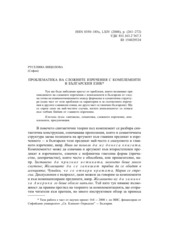The problems of the complex sentences with complements in Bulgarian
Апстракт
The investigation of the complex sentences with complements in Bulgarian is a multifactor analysis, which has to take into account the following issues: a) the lexical meaning of the main predicate, which determines the meaning of the complement in general; b) the grammatical meanings of the main predicate - person (a special role plays the opposition between the speaker and the other participants in communication), number, tense, mood, evidentiality affirmativity or negation; c) the functions of the linking words - complementizers, particles, interrogatives, relatives; d) the meaning of the complement and its related presuppositions or implications (if any), its modality, its illocutionary force, its formal structure, its syntactic position in the complex sentence; e) the combinatorial potential of the matrix sentence and the complement in both aspects - semantic and formal.
Извор:
Јужнословенски филолог, 2008, 64, 261-272Финансирање / пројекти:
- Projekat Sofijskog univerziteta 'Sv. Kliment Ohridski', Bugarska, br. 164
TY - JOUR AU - Ницолова, Руселина PY - 2008 UR - https://dais.sanu.ac.rs/123456789/2918 AB - The investigation of the complex sentences with complements in Bulgarian is a multifactor analysis, which has to take into account the following issues: a) the lexical meaning of the main predicate, which determines the meaning of the complement in general; b) the grammatical meanings of the main predicate - person (a special role plays the opposition between the speaker and the other participants in communication), number, tense, mood, evidentiality affirmativity or negation; c) the functions of the linking words - complementizers, particles, interrogatives, relatives; d) the meaning of the complement and its related presuppositions or implications (if any), its modality, its illocutionary force, its formal structure, its syntactic position in the complex sentence; e) the combinatorial potential of the matrix sentence and the complement in both aspects - semantic and formal. T2 - Јужнословенски филолог T1 - The problems of the complex sentences with complements in Bulgarian SP - 261 EP - 272 IS - 64 DO - 10.2298/JFI0864261N UR - https://hdl.handle.net/21.15107/rcub_dais_2918 ER -
@article{
author = "Ницолова, Руселина",
year = "2008",
abstract = "The investigation of the complex sentences with complements in Bulgarian is a multifactor analysis, which has to take into account the following issues: a) the lexical meaning of the main predicate, which determines the meaning of the complement in general; b) the grammatical meanings of the main predicate - person (a special role plays the opposition between the speaker and the other participants in communication), number, tense, mood, evidentiality affirmativity or negation; c) the functions of the linking words - complementizers, particles, interrogatives, relatives; d) the meaning of the complement and its related presuppositions or implications (if any), its modality, its illocutionary force, its formal structure, its syntactic position in the complex sentence; e) the combinatorial potential of the matrix sentence and the complement in both aspects - semantic and formal.",
journal = "Јужнословенски филолог",
title = "The problems of the complex sentences with complements in Bulgarian",
pages = "261-272",
number = "64",
doi = "10.2298/JFI0864261N",
url = "https://hdl.handle.net/21.15107/rcub_dais_2918"
}
Ницолова, Р.. (2008). The problems of the complex sentences with complements in Bulgarian. in Јужнословенски филолог(64), 261-272. https://doi.org/10.2298/JFI0864261N https://hdl.handle.net/21.15107/rcub_dais_2918
Ницолова Р. The problems of the complex sentences with complements in Bulgarian. in Јужнословенски филолог. 2008;(64):261-272. doi:10.2298/JFI0864261N https://hdl.handle.net/21.15107/rcub_dais_2918 .
Ницолова, Руселина, "The problems of the complex sentences with complements in Bulgarian" in Јужнословенски филолог, no. 64 (2008):261-272, https://doi.org/10.2298/JFI0864261N ., https://hdl.handle.net/21.15107/rcub_dais_2918 .


